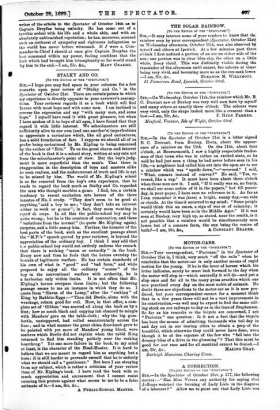STALKY AND CO.
[To THE EDITOR OF THE "SPECTATOR."] Sin,—I hope you may find space in your columns for a few remarks upon your review of "Stalky and Co." in the Spectator of Ostober 21st. There are certain'points in which my experience is directly opposite to your reviewer's assump- tions. Your reviewer regards it as a book which will find favour with most boys and with some men. I am inclined to reverse the expression and say "with many men, and some boys." I myself have read it with great pleasure, but when I have spoken of it to boys of all ages, I have found that they regard it with little interest. We schoolmasters are still sufficiently alive to our own (and one another's) imperfections to appreciate a caricature which, like all good caricatures, has a solid foundation of fact. I suppose we should all of us prefer being caricatured by Mr. Kipling to being canonised by the author of "Eric." To us the great charm and interest of the book is that it is a school story, written at any rate not from the schoolmaster's point of view. But the boy's judg- ment is more superficial than the man's. That there is exaggeration in the description of boys and masters alike Le soon realises, and the undercurrent of truth and life is apt to be missed by him. The world of Mr. Kipling's school is so far removed from the boy's own experience, that he tends to regard the book much as Stalky and Co. regarded the man who thought marbles a game. I find, too, a certain tendency to resent exaltation into heroes of the three inmates of No. 5 study. "They don't seem to be good at anything," said a boy to me ; "they don't take an interest either in work or gmes"; in fact, they seem wanting in e,prit de corps. In all this the public-school boy may be quite wrong ; but he is the creature of convention, and these "variations from the normal" (to quote Mr. Kipling again), 'surprise, and a little annoy him. Farther, the humour of the best parts of the book, such as the excellent passage about the " M.P.'s " speech quoted by your reviewer, is beyond the appreciation of the ordinary boy. I think I may add that t .e public-school boy would not entirely endorse the remark that there is nothing "mean or cowardly" in the book. Every now and then he feels that the heroes overstep the bounds of legitimate warfare. He has certain standards of his own of what is " good " and 'bad form," and while prepared to enjoy all the ordinary " scores " of the boy in the conventional warfare with authority, he is a barbarian only within limits. It is not often that Mr. Kipling's heroes overpass these limits ; but the following passage seems to me an instance in which they do so. I quote from "Slaves of the Lamp," after the " rocking " of King by Rabbits-Eggs :—" Then did Beetle, alone with the wreckage, return good for evil. How, in that office, a com- plete set of 'Gibbon' was scarred all along the back as by a flint; how BO much black and copying ink chanced to mingle with Menders' gore on the table-cloth ; why the big gum- bottle, unstoppered, had rolled semicircalarly across the floor ; and in what manner the great china door-knob grew to be painted with yet more of Menders' young blood, were matters which Beetle did not explain when the rabid King returned to find him standing politely over the reeking bearthrug." Yet one more failure in the book, to my mind at least, is the character of the Head-Master. It is hard to believe that we are meant to regard him as anything but a hero: it is still harder to persuade oneself that he is entirely what we should call a "gentleman." But here I am straying from my subject, which is rather a criticism of your review than of Mr. Kipling's book. I have read the book with so much appreciation and amusement that I cannot resist entering this protest against what seems to me to be a false estimate of it —I am, Sir, &c.,
A PUBLIC-SCHOOL MASTER.






































 Previous page
Previous page